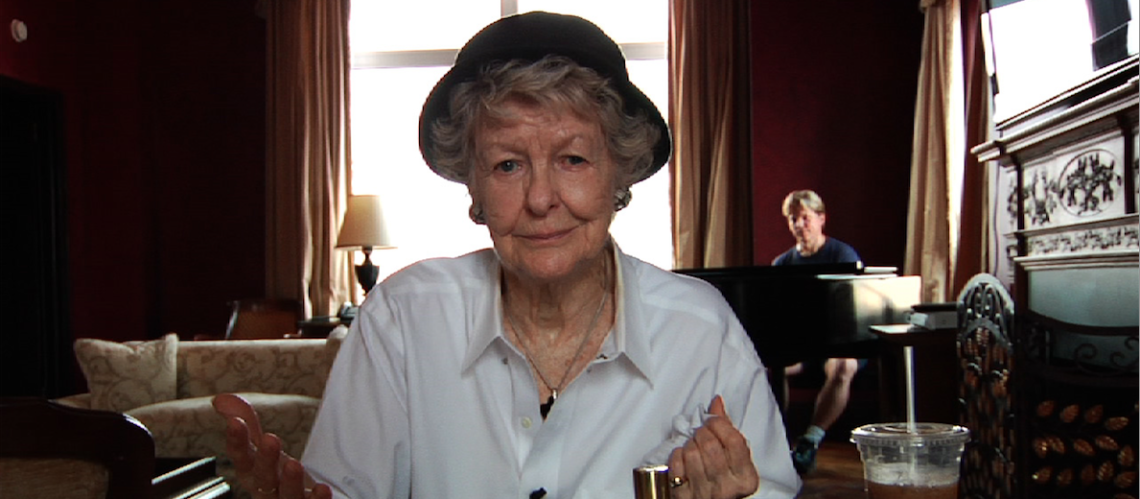During the course of Elaine Stritch: Shoot Me, the veteran Broadway actress repeatedly reminds us that she is 87 years old. We wouldn’t believe it otherwise. Sure, she forgets an occasional lyric in rehearsals and onstage, but forgetfulness isn’t age-specific. Her energy level may also wane in private, due to diabetes or the stage fright she’s fought her entire career. But when she greets her audience, she’s a ball of feisty energy that skews far younger than her chronological age. Onstage in her trademark dress shirt and lack of pants, Stritch isn’t afraid to show her famous legs and continuously validate her reputation as a “trooper.”
Chiemi Karasawa’s excellent, warts-and-all documentary follows Stritch as she prepares for a show at the Café Carlyle in New York City. The show, entitled “At Home at the Carlyle: Elaine Stritch Singin’ Sondheim…One Song at a Time,” finds Stritch in familiar territory. She belts out standards by the man who, for their first collaboration in 1970, wrote her signature song, “The Ladies Who Lunch” from “Company.” Since then, Stritch has become one of the premiere Sondheim interpreters, to the point where she did a show called “Elaine Stritch Sings Sondheim Again…Why Not?”
Before Sondheim, Stritch played Martha in “Who’s Afraid of Virginia Woolf,” took over for Ethel Merman in the US tour of “Call Me Madam” and had an entire musical written for her by the great Noel Coward. After “Company,” Stritch appeared in a 1985 revival of “Follies,” where she sang “Broadway Baby.” Several years later, “Follies” would also provide Stritch with Broadway Baby’s polar opposite, the preternaturally appropriate “I’m Still Here.”
Elaine Stritch: Shoot Me makes a valid case for why “I’m Still Here” serves as Stritch’s theme song. She’s incredibly candid about her 70 year career, discussing her alcoholism, her stage fright, her ten-year marriage to John Bay and her lifelong insecurities. In a small scene, she exhibits an almost maternal concern for fellow diabetes sufferer, Tracy Morgan. “What’s your blood sugar?” she demands on the set of 30 Rock. Not surprisingly, Stritch’s level is lower than his.
The salty mouth that scared the hell of the FCC during her 30 Rock Emmy speech is in full effect; the F-bomb is employed with the skill of a sailor but never seems inappropriate. Stritch is a master storyteller, and though Karasawa covers some of the same ground Stritch did in her Tony winning one woman show, Elaine Stritch at Liberty, the stories never get tired. And there are always new stories to tell.
For all her brashness, Stritch exhibits a surprising amount of humility. Veteran Broadway director Harold Prince points this out during his interview. “Underneath all that, she’s still that convent girl,” says Prince. When shown the rehearsal room that will bear her name at Stella Adler’s, she expresses concern that the room is too big. “We need something smaller,” she demands. It takes two extra tries, but Stritch eventually hangs her name on much more humble accommodations than she was originally offered.
Stritch’s collaborators provide the talking heads in Elaine Stritch: Shoot Me. In addition to Hal Prince, we hear from George C. Wolfe, who directed “Elaine Stritch: At Liberty,” Alec Baldwin, whom Stritch hilariously tormented on 30 Rock, and James Gandolfini, whose presence is bittersweet. “If we’d both been 35 at the same time,” he says, “we would have entered into a torrid affair that would not have ended well!” (The documentary is dedicated to Gandolfini.)
Karasawa’s camera seems to be everywhere. It casts an unblinking eye in some very uncomfortable places. Stritch struggles during rehearsals with her longtime collaborator Rob Bowman. She agonizes over the show. She suffers low blood-sugar episodes and, in the documentary’s most harrowing, upsetting sequence, Stritch suffers what appears to be a mini-stroke. I kept expecting Stritch to yell “Turn that camera off!” She never does; it would be a violation of the truth.
On opening night at the Carlyle, Sondheim sends Stritch a note that reads “I won’t be there. Feel free to make up lyrics.” The audience is captivated, and when Stritch forgets a lyric, she keeps everyone eating out of the palm of her hand while she racks her brain. Eventually she remembers the correct words, and delivers them with expert timing and impeccable grace.
Stritch speaks honestly about her mortality. At 87, she harbors no fantasies about extended amounts of time. “Elaine Stritch: Shoot Me” makes you wish she would live forever.




















